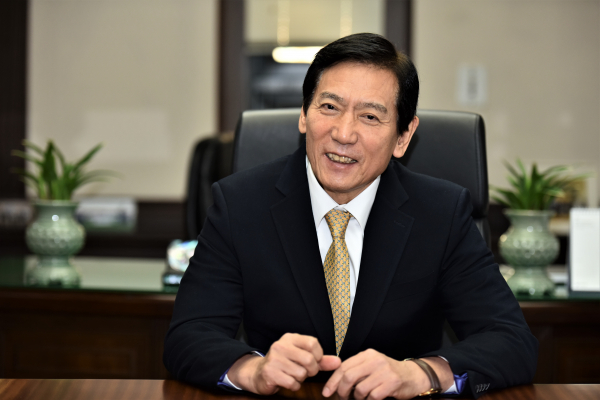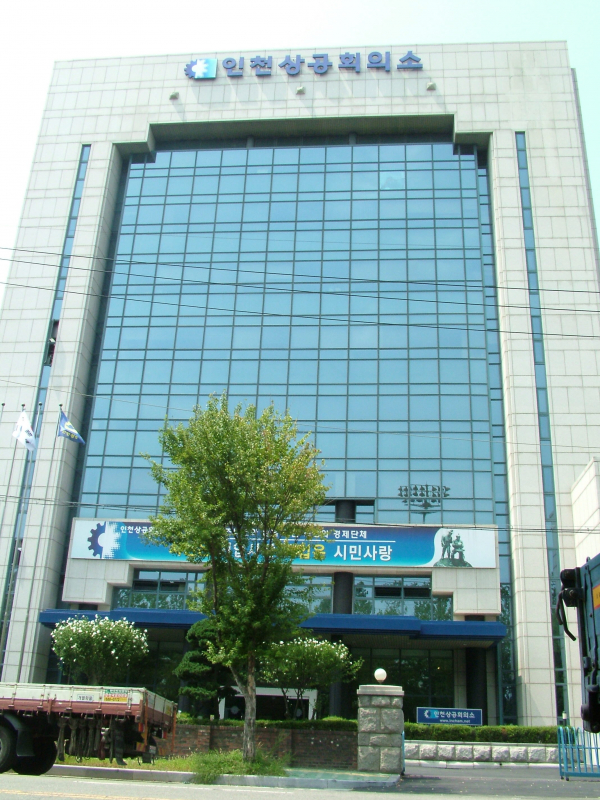Incheon Poised to Lead Korea’s Economic Growth in Post-viral Era

Lee Kang-shin, chairman of the Incheon Chamber of Commerce & Industry
COVID-19 is a challenge that demands companies and governments address multiple dimensions that go beyond the pandemic’s health implications. The Korean government, says Lee Kang-shin, chairman of the Incheon Chamber of Commerce & Industry, needs to come up with policies to help companies navigate through uncertain times and adapt to the new normal. For the city of Incheon, he paints a rosy picture in the post-viral era as it is home to the world’s finest social overhead capital. Yet he called on the central government to accelerate deregulation to help Incheon realize its immense growth potential. Following are excerpts of an interview with Lee. — Ed.
How is the Incheon Chamber of Commerce & Industry (ICCI) responding to the economic impact of COVID-19?
According to a recent survey, the business sentiment index of the manufacturing sector is 50 and that of retail and distribution is 56 for the third quarter of this year. The figures show that enterprises are very pessimistic about the status quo.
The government needs to come up with more policies so that companies can find a breakthrough with the pandemic, which is fundamentally changing the global economy.
The policies have to focus on helping them overcome the crisis and prepare for the new normal, that is, the post-COVID-19 era. The policies have to come in the form of financial and tax assistance, domestic consumption promotion and many other practical and realistic measures.
At the same time, various regulations that have hindered their activities have to be reconsidered. Labor flexibility and competitiveness enhancement based on bold deregulation are necessary for their sustainable growth.
What do you think is necessary to adapt to the new economic environment?
Entrepreneurs need to give a thought to the emergence of digital economy and the collapse of global value chains, which are two of the most important keywords of this COVID-19 era.
Online contact is replacing physical with the pandemic leading to more and more non-face-to-face activities. More smart factories need to be introduced and online and contactless work systems should be established without delay.
The pandemic has shown that global value chains may collapse. Stable supply is emerging as a production factor as important as cost. This means stable local supply networks are now as important as global supply networks on the part of enterprises.
How should the economy overhaul itself with the pandemic going on?
We are now realizing that we have to deal with systems and fundamentals as well as pending issues to get over a crisis.
For example, regulations are hindering reshoring to the capital area, which is necessary with the value chains collapsing. In other words, enterprises are failing to do business in their favorite place. Besides, the capital area has been ruled out of the government’s deregulation zone policy for the growth of innovative and strategic industries. This means regulations on the most competitive area are affecting the national competitiveness of South Korea.
Those regulations covering the entire business activities have to be reconsidered for economic growth after COVID-19.
What is your diagnosis of the past, present and future of the economy of Incheon?
Incheon led the modernization and industrialization of South Korea as home to the country’s first railroad, first communications, first expressway, and so on. Incheon is one of the fastest-growing South Korean cities. Here, Incheon International Airport opened in 2001, New Incheon Port opened in 2015 and the population topped three million in 2016. It was designated as a free economic zone in as early as 2003.
Unfortunately, though, the qualitative growth of the city has fallen short of its quantitative growth. The manufacturing sector of the city, its industrial backbone, is losing its competitive edge and its service sector is still small in scale. The knowledge-based part of the service industry is still fragile despite its huge growth potentials and job creation capabilities. This has led to Incheon citizens’ income lower than the national average and large household debts.
Still, the economy of Incheon is capable of growing. The ratio of young people of the city is higher than those of most South Korean cities and it has accumulated industrial expertise and competitiveness for long. It is home to the world’s finest social overhead capital. The ICCI will do its utmost so that Incheon can create a better future by making the most of its resources and capabilities.

The main office of the Incheon Chamber of Commerce & Industry
What is the ICCI’s stance on reshoring?
The central government has made efforts to facilitate reshoring by, for example, revising the Act on Assistance to Korean Off-shore Enterprises in Repatriation. However, only 68 companies have benefited from the efforts and only two have returned to Incheon since the law became effective seven years ago.
According to our October 2013 survey covering companies that relocated to China from Incheon, 34.1 percent, 32.9 percent, 10.6 percent, and 10 percent of the companies did so for lower labor costs, market creation, relocation to China of their parent companies or business partners, and strategic partnership with local companies, respectively. In addition, 83 percent of the respondents said that they would return to the capital area, that is, Seoul, Gyeonggi and Incheon, if they came back to South Korea.
At present, rapidly rising minimum wages and shorter working hours are leading to an increase in labor-related costs and hampering reshoring. Moreover, the central government’s reshoring policy has been limited to non-large companies and failed to result in large companies’ reshoring, which will be much greater in impact.
More policies are needed for reshoring of South Korean companies, large ones in particular. Also, labor-related cost reduction and deregulation in the capital area are urgent as well.
What is on the ICCI’s economic legislation wishlist for this year and what is its feasibility?
The Incheon office of the Citizens’ Coalition for Economic Justice and the ICCI sent a letter to both the ruling and opposition parties in March this year and the letter contains the necessity of a change in metropolitan policy, more decentralization of governance and a blueprint for the future of the economy of Incheon.
The Seoul Metropolitan Area Readjustment Planning Act, which took effect about four decades ago, has blocked the city from making the most of its regional capabilities. The central government needs to revoke the law, overhaul the Special Act on Balanced National Development, and abolish superfluous regulations related to Incheon’s infrastructure, the Ganghwa-Ongjin area, etc.
In addition, regional financial expansion based on an increase in local tax ratio, administrative authority transfer related to ports, small and medium-sized enterprises, and so on and more participation in the management of national public enterprises located in the city will facilitate region-specific policies based on the decentralization of power.
Incheon is home to foundations for new industries such as biotech and healthcare as well as traditional manufacturing components and infrastructure. I am convinced that the economy of Incheon will continue to flourish based on a new economic zone that surrounds Incheon International Airport, a new master plan for the development of Incheon Port, a manufacturing revival and a strategic concentration on biotech and healthcare.
We are anticipating that the three key agenda items will be proactively and efficiently handled in the current session of the National Assembly.